When Todd Howard revealed Fallout 76 at Bethesda’s E3 2018 press conference, he spoke of it as a unifying experience for the series’ fandom.
“So many of us talk about experiences in [Bethesda] games but we’ve never experienced them together,” Howard said. “So about four years ago, we hit upon an idea that is perfect for Fallout: open world. Survival. Every person and character is real.”
For the first time in the series’ history, fans of the post-apocalyptic RPG series could come together to reclaim a destroyed world through online multiplayer. Side by side, they would wander the wastes of West Virginia, fighting off mutated monstrosities and a hostile environment to clear the way for the birth of a new community and civilization.
It was ambitious and unexpected. More than a few fans were left skeptical of the change from the series’ single player roots, with the series never having tried anything even close to this outside of modding. And yet, it was undeniable that the idea behind the game had great potential if implemented correctly.
Today, this idea of unification is slowly being realized, though not in the way most would have expected. The series’ fandom has come together not only to reclaim Fallout 76’s digital wasteland, but to salvage the experience of Fallout 76 itself. They have and continue to work together with Bethesda and each other to help the game reach its full potential, and make the most of a game they’ve made their own.
And, like so many other stories set within the Fallout universe, it started with a calm before the nuclear storm.
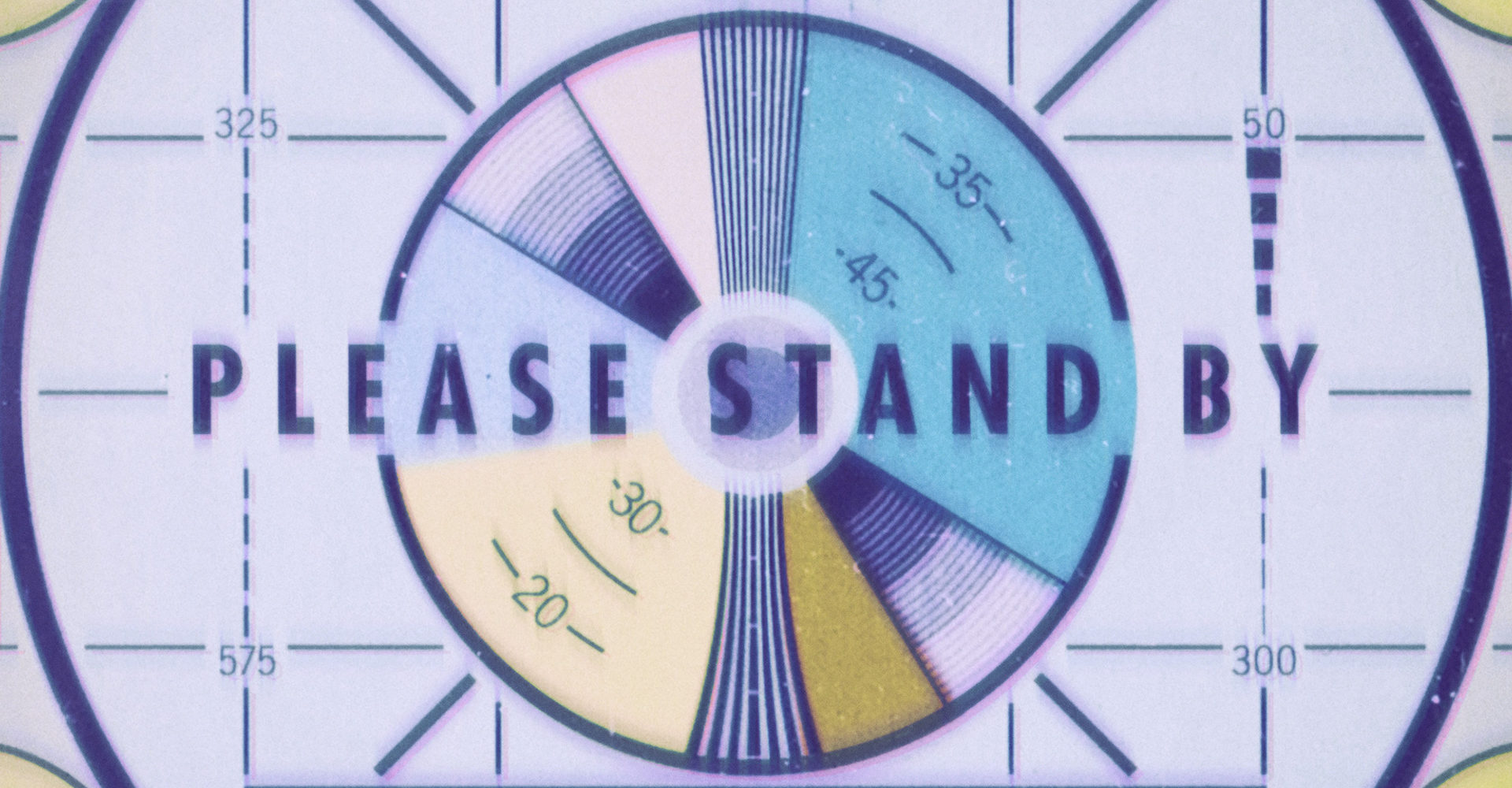
Credit: Bethesda Softworks
Promises of a new world
In the days before Fallout 76’s launch, anticipation was high among the fanbase. This was the case for Jess M., better known as Quantum Pixie. A streamer on Twitch as well as a long-time fan of Fallout and online titles like World of Warcraft, the promise of an online Fallout excited her. She’d been a part of other online communities before and knew that some of the most popular and successful streamers got in on those titles from day one.
“I thought, ‘How cool would it be to be one of those people who has been playing it since it came out?’” Pixie said. “‘How great would it be to have that kind of history with a game like Fallout 76?’”
Because of this, she was eager to get her hands on the game as soon as possible, not only to play another Fallout title but to do so alongside other players in real time. To that end, she planned on diving into the experience from day one, becoming someone people could turn to throughout its lifetime for information, advice and content via her streams.
She and so many others looked forward to the much hyped “Reclamation Day” launch. Even with the rough impressions given by the press and players who took part in the game’s beta, there was still hope Bethesda would deliver a top of the line experience like they always did.
Finally, on November 14th, the game launched. In the following days and weeks, all hell broke loose.
A hostile world
Fallout 76 was plagued with issues across the board, both from a technical and core design standpoint. Server crashes ran rampant, bumping players in and out of play sessions at random. High-level enemies like Deathclaws and Scorch Beasts spawned in and out of the game at random, delivering death to low-level players and taking away high-level players’ desperately fought-for kills in equal measure. The real players that were meant to carry the burden of environmental storytelling usually provided by NPCs were mostly griefers and player hunters killing others the moment they saw them.
As a result, the game wasn’t well received. Critics gave the game middling to negative reviews, resulting in the lowest Metacritic scores of any Bethesda Game Studios title to date. Disgruntled fans piled on by review-bombing the game, driving its user scoring below 30 percent mere hours after the game launched.
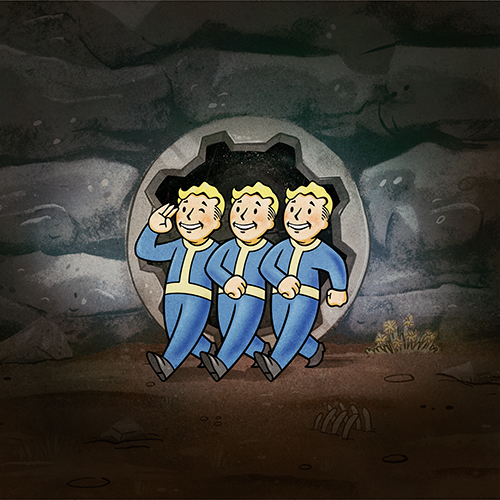
Credit: Bethesda Softworks
When players turned to Bethesda for answers and support, they were met with a delayed response. Many took to social media to air their frustrations and disappointment in the game and its handling, throwing up images and videos of the game’s bugs and technical issues as proof.
That’s to say nothing of other controversies that arose surrounding the game. Players needing to wait half a year for a canvas bag supposed to be included in the collector’s edition, a potential legal dispute regarding Bethesda’s refund policies, and a breach of players’ personal information via Bethesda’s support page all made matters worse, elongating the turmoil surrounding the game and the negativity surrounding it.
All of this bad press, disappointment, and controversy surely soured some players on picking the game up, even dissuading some of those who had been looking forward to the game from buying it at launch.
“I was hesitant like everyone else on launch day, given the bad reviews and complaints,” Fallout 76 player X–Henny–X said. “My friends and I were pretty excited until those reviews dropped. We all decided not to get it.”
The turmoil continued for weeks, with the Fallout 76 fandom caught in the middle. Eventually though, the dust settled, leaving them with a virtual world mired with negativity and beset by hostile elements both from both the game design and players.
Reclamation
While many left the game or avoided it outright after its rocky launch, others stayed behind or found their way back to the game, motivated by their love for the Fallout series.
“I couldn’t pass up on a Fallout release. I’ve played them all since Fallout 3,” Henny said. A few days after launch, they decided to pick the game up, despite having to do so without their friends.
Quantum Pixie felt a similar sentiment, also taking into account the fact that most online game launches were rocky.
“The first year of most games like [Elder Scrolls Online], World of Warcraft, any other online game, their first year is always rough,” Pixie said. “I know it’s going to take time for things to get worked on, get better, get improved, and I’m so passionate about Fallout. Despite the fact that there were bugs and connection issues—you can’t deny that, those were facts that were happening—I could see it through. I liked it so much that I could still be a part of it.”
They, along with many others in the fandom, decided to do exactly what Fallout 76 had initially asked of its players: join together to rebuild a broken world and establish a community unlike any other.
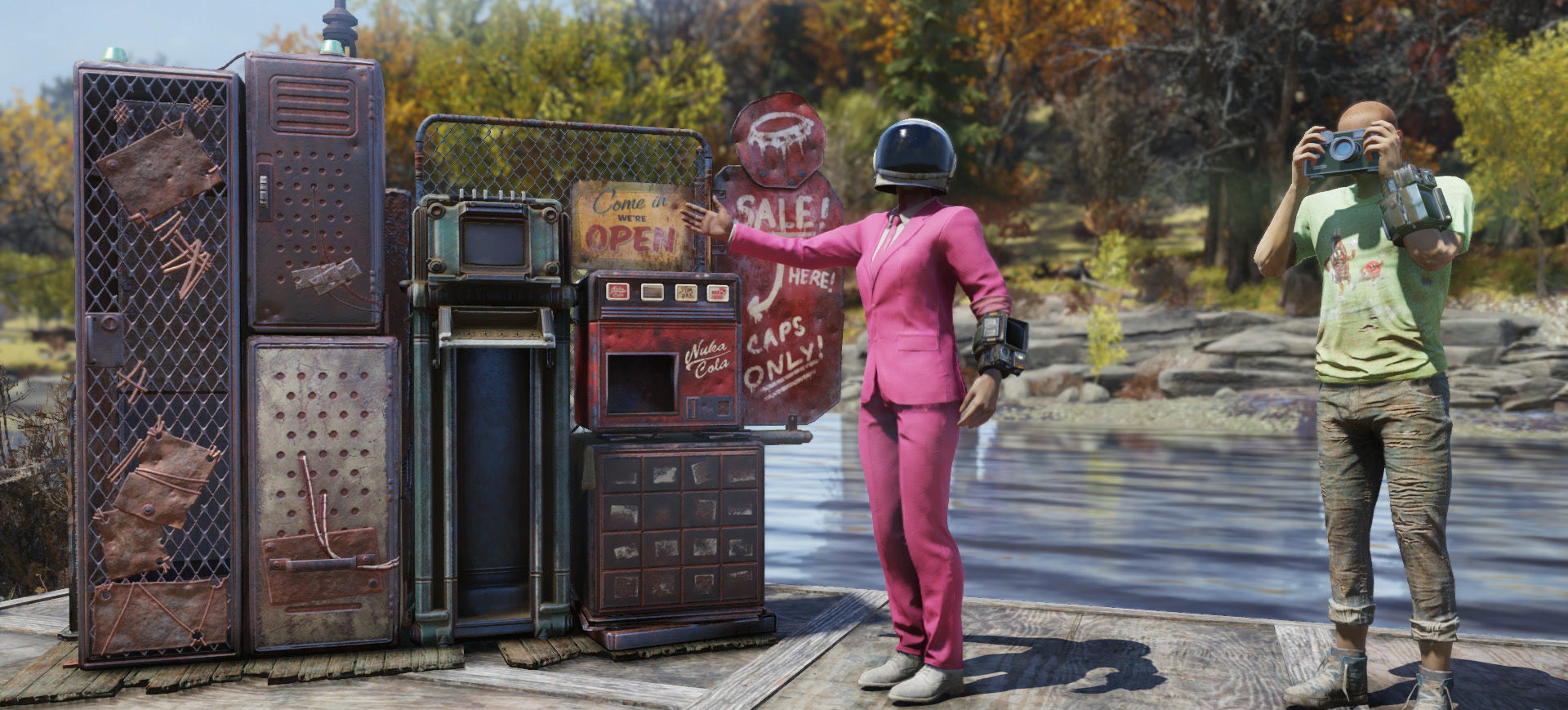
Credit: Bethesda Softworks
In the following months, each set about this in their own way. For Pixie, this meant using her reach as a streamer to expose players to elements of the title both good and bad, and to guide them on how to communicate views on these elements to Bethesda. She went in depth on this during her streams, emphasizing the importance of being courteous and polite in criticism as opposed to the hostility shown in the first few weeks of the game’s availability.
“If you go onto [Bethesda’s support page] and say, ‘This is garbage,’ it’s not going to work to say that. But if you go in there and say, ‘Look, this is how I felt about this, this is how I felt it could be improved,’ they’ll listen to you,” Pixie said. “Bethesda even says in their updates now, ‘We have looked at the feedback. We are reading your feedback. We appreciate your feedback.’It’s noticed.”
Other players focused on doing what they could to address what people said the game lacked and improve the experience for others. Well before player vending was officially added to the game, Henny used the base building mechanic to aid in the festivities of the Fasnacht Parade event, which saw players meet up to celebrate the turning of winter into spring with a parade of masked robots and wastelanders through the Helvetia area. They built a base to look like a shop at the end of the parade’s route and sold or traded surplus items and plans to any interested, essentially taking on the role of an NPC—the absence of which players lamented.
“It was a huge success,” Henny said. “I was selling and trading plans constantly. I wasn’t even doing it for the caps, just to see others piling into my shop and being friendly with one another, getting plans they’ve been looking for and being excited about it.”
Reestablishing civility
Most important of all, though, was the fostering of a wide-spread attitude of helpfulness among the Fallout 76 community. High-level veterans and low-level newcomers alike, encouraged each other to engage in helpful behavior and play styles to make the game as welcoming as possible.
Player-hunting and fighting amongst one another was and is policed and regulated strictly in-game by the community even following the addition of a PvP mode by Bethesda. Specific areas and arenas have been constructed by the community, wherein players seeking to fight one another could do so without drawing the ire of others.
“The most fun I have had with Fallout 76 came with a ‘community event’ that was made completely by players themselves,” Reddit user DynastyKit said. “Someone turned their C.A.M.P. into an arena with seating, viewing areas, a bar, the whole works. Everyone would get on voice chat and cheer on PVP fights in the arena. Players made bets on each [match] on who would win and so on.”
Players also do their best to resolve issues without killing each other whenever possible by apologizing to one another for wrongdoing before blood is shed or by turning themselves in to other players seeking bounties for their crimes to avoid a widespread manhunt. Those that do so typically see their gear protected by other players until they can respawn and grab it, whereas remorseless troublemakers have their hard-earned spoils taken without a second thought.
Players also actively started to share items, equipment and resources with any who needed it, looking to help one another survive the harsh early hours of the game.
“I’ve dropped silly amounts of ammo and food and chems for players, and had some dropped for me in return when I am on a low level,” Reddit user Bignholy said. “It’s not uncommon to wander through Whitesprings or Watoga or Flatwoods and find little goodies stashed in world containers: nice, fully modded low-level weapons or ammo or plans. It’s almost normal to find spare plans in the Flatwoods overseer box or the Whitesprings cash registers. And most of the time, you never know who the anonymous benefactor is, or why they did it, but you know someone thought about the other players enough to leave a surprise for them.”
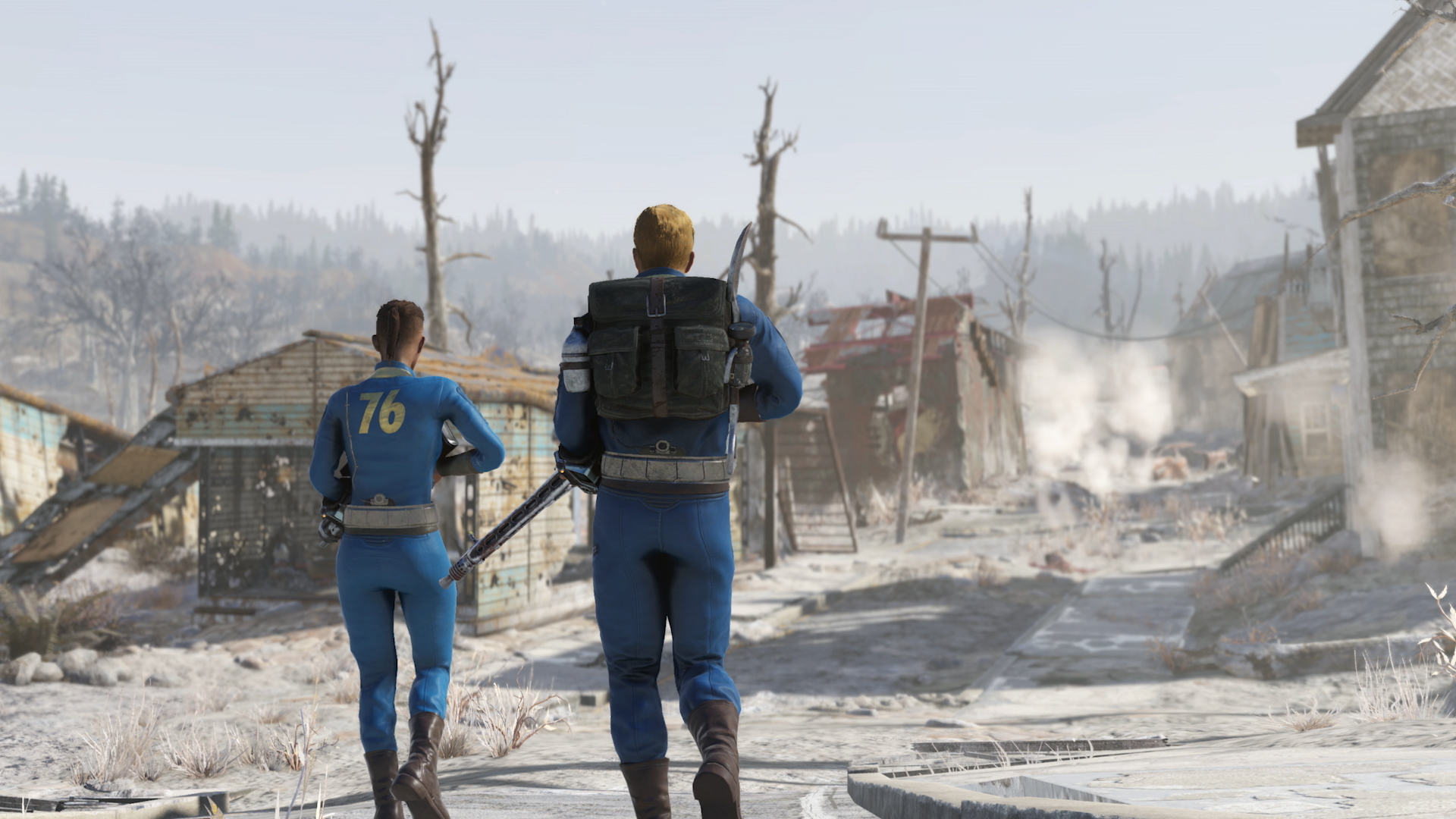
Credit: Bethesda Softworks
Others act as guides, teachers and assistants to new players. Cassie Brown, a player since launch, recalled encountering a low-level player who was still learning the ropes of the game. She decided to help him along by giving him some low-level legendary gear, and then did her best to give him advice and answer any questions he had about the game.
“While we stood there talking, other people heard that he was a new player to the game and also started rummaging through their stashes to see what they had,” Brown said. “We all genuinely just wanted to help him enjoy the game more.”
Even as Bethesda addresses more and more of the game’s technical issues, the community continues to work together to improve the experience, fostering a positive and welcoming environment whenever possible.
A big part of this is to stave off the negativity that surrounded the game at launch.
“The Fallout 76 community has had to deal with so much negativity about what they like to do, and something that they love so much,” Pixie said. “They’re so happy when they see another person enjoying the thing they love that they want to help them enjoy it even more.”
And yet, the community also isn’t blind to the impact the negative press could have had on the adoption of this mindset, directly or indirectly.
“As far as the negative press contributing to that, I think the negativity helped people grow tighter,” Pixie said. “But I can’t say for sure. I just don’t know what it would have been like without the negative press really.”
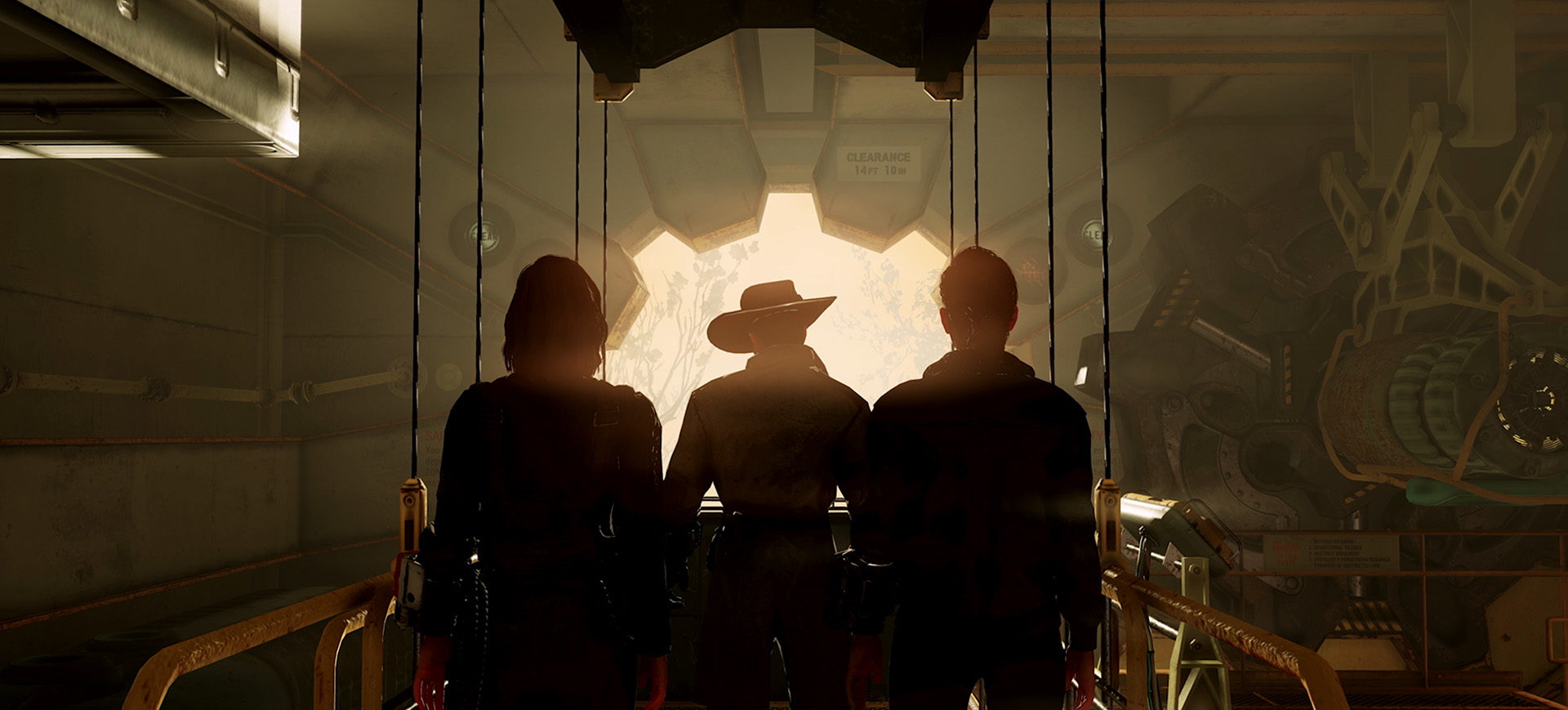
A brighter future
Today, Fallout 76 is a vastly different game to what it was at launch. Bethesda has taken steps in several areas to address issues across the board, bringing Fallout 76 up to the standard it originally sold to players.
Server stability, game-breaking bugs and other technical aspects have been addressed through several updates for the game, stabilizing the experience to make it more playable and immersive—even adding official support for player-owned shops in the form of vending machines. The company has a slew of events and DLC planned for release in the coming months. This fall’s Wastelanders update will finally introduce human NPCs and a dialogue system, marking a significant reversal from Bethesda’s initial plans.
The team has also strived to be more communicative with fans about these updates and fixes, providing regular posts and patch notes on what it plans to add and when.
All the same, the fans are still largely to thank for a lot of the peace, stability and immersion players can now enjoy. Pixie continues to stream the game, still guiding and educating players whenever needed. Many players now see her as a matriarch to the community, going to her for honest opinions and advice on the game and its mechanics. She still does what she can to help the community, whether that means streaming new content and speaking openly about its strengths and weaknesses or taking new players under her wing for a play session.
Henny, meanwhile, has continued to play the shopkeep long after the success of their Fasnacht Parade shop. they now run a shop near the Whitespring Station, enjoying heavy traffic and regular business from other players.
“I feel like I have a second job at times working that damn shop,” Henny said. “But that’s the thing about 76… It’s not about the endgame, the [Scorch Beast Queen] fights, [Two Shot Explosive] weapons, or any of that. It’s about just living in post-nuclear Appalachia, being friendly with your neighbor, sharing resources, helping others along the way, making it fun and interesting for others adventuring.”
They also managed to convince their friends to give the game another shot.
“We all got together for a game day and had a blast exploring Appalachia as low-levels,” they said. “Played about 6 hours non stop laughing and having fun the whole time.”
As for whether this role and influence will persist moving forward, Pixie is hopeful thanks to the positive base Fallout 76’s early adopters and fans have provided for the game, especially with so much of the game’s lifespan still unspent.
“I think people forget that this is still a very new game, and it’s a good start for the community,” she said. “To be willing to be so supportive and constructive about, and open about, giving feedback about where they think the game should go. I hope they continue to be like that.”
Header image: Bethesda Softworks

Keenan McCall is a freelance video game journalist and has been for the past two years. He has a penchant for diving into the different communities and odd tales found throughout gaming’s past and present, and has striven to share what he finds through pieces for sites like Game Informer, Cliqist and New Normative. He currently writes for Twinfinite while acting as a member of the gaming podcast Playing With Perspective, and can be found sharing pet memes on Twitter @KEeNanMcCall525.